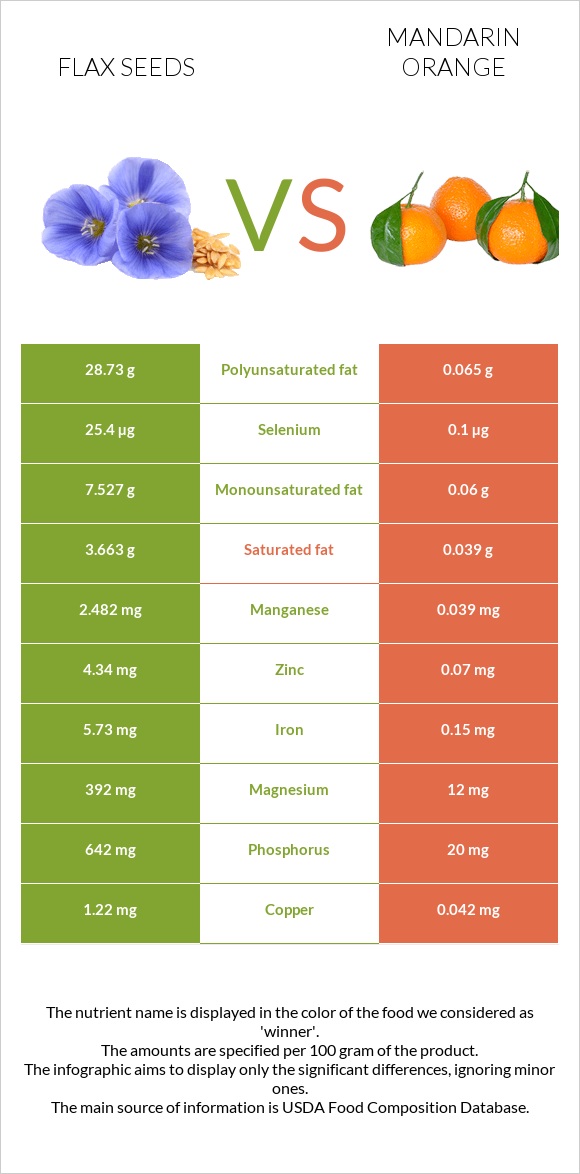Flax seeds vs. Mandarin orange — In-Depth Nutrition Comparison
Compare
How are flax seeds and mandarin oranges different?
- Flax seeds are higher than mandarin oranges in vitamin B1, copper, manganese, fiber, magnesium, phosphorus, iron, selenium, zinc, and vitamin B6.
- Flax seeds cover your daily need for vitamin B1, 132% more than mandarin oranges.
- Flax seeds contain 254 times more selenium than mandarin oranges. Flax seeds contain 25.4µg of selenium, while mandarin oranges contain 0.1µg.
Seeds, flaxseed and Tangerines, (mandarin oranges), raw types were used in this article.
Infographic

Infographic link
Mineral Comparison
Mineral comparison score is based on the number of minerals by which one or the other food is richer. The "coverage" charts below show how much of the daily needs can be covered by 300 grams of the food.
| Contains more MagnesiumMagnesium | +3166.7% |
| Contains more CalciumCalcium | +589.2% |
| Contains more PotassiumPotassium | +389.8% |
| Contains more IronIron | +3720% |
| Contains more CopperCopper | +2804.8% |
| Contains more ZincZinc | +6100% |
| Contains more PhosphorusPhosphorus | +3110% |
| Contains more ManganeseManganese | +6264.1% |
| Contains more SeleniumSelenium | +25300% |
| Contains less SodiumSodium | -93.3% |
Vitamin Comparison
Vitamin comparison score is based on the number of vitamins by which one or the other food is richer. The "coverage" charts below show how much of the daily needs can be covered by 300 grams of the food.
| Contains more Vitamin EVitamin E | +55% |
| Contains more Vitamin B1Vitamin B1 | +2734.5% |
| Contains more Vitamin B2Vitamin B2 | +347.2% |
| Contains more Vitamin B3Vitamin B3 | +719.1% |
| Contains more Vitamin B5Vitamin B5 | +356% |
| Contains more Vitamin B6Vitamin B6 | +506.4% |
| Contains more Vitamin KVitamin K | +∞% |
| Contains more FolateFolate | +443.8% |
| Contains more Vitamin CVitamin C | +4350% |
| Contains more Vitamin AVitamin A | +∞% |
All nutrients comparison - raw data values
| Nutrient |  |
 |
DV% diff. |
| Polyunsaturated fat | 28.73g | 0.065g | 191% |
| Vitamin B1 | 1.644mg | 0.058mg | 132% |
| Copper | 1.22mg | 0.042mg | 131% |
| Manganese | 2.482mg | 0.039mg | 106% |
| Fiber | 27.3g | 1.8g | 102% |
| Magnesium | 392mg | 12mg | 90% |
| Phosphorus | 642mg | 20mg | 89% |
| Iron | 5.73mg | 0.15mg | 70% |
| Fats | 42.16g | 0.31g | 64% |
| Selenium | 25.4µg | 0.1µg | 46% |
| Zinc | 4.34mg | 0.07mg | 39% |
| Protein | 18.29g | 0.81g | 35% |
| Vitamin B6 | 0.473mg | 0.078mg | 30% |
| Vitamin C | 0.6mg | 26.7mg | 29% |
| Calories | 534kcal | 53kcal | 24% |
| Calcium | 255mg | 37mg | 22% |
| Potassium | 813mg | 166mg | 19% |
| Monounsaturated fat | 7.527g | 0.06g | 19% |
| Folate | 87µg | 16µg | 18% |
| Vitamin B3 | 3.08mg | 0.376mg | 17% |
| Saturated fat | 3.663g | 0.039g | 16% |
| Vitamin B5 | 0.985mg | 0.216mg | 15% |
| Choline | 78.7mg | 10.2mg | 12% |
| Vitamin B2 | 0.161mg | 0.036mg | 10% |
| Carbs | 28.88g | 13.34g | 5% |
| Vitamin A | 0µg | 34µg | 4% |
| Vitamin K | 4.3µg | 0µg | 4% |
| Fructose | 0g | 2.4g | 3% |
| Sodium | 30mg | 2mg | 1% |
| Vitamin E | 0.31mg | 0.2mg | 1% |
| Net carbs | 1.58g | 11.54g | N/A |
| Sugar | 1.55g | 10.58g | N/A |
| Tryptophan | 0.297mg | 0.002mg | 0% |
| Threonine | 0.766mg | 0.016mg | 0% |
| Isoleucine | 0.896mg | 0.017mg | 0% |
| Leucine | 1.235mg | 0.028mg | 0% |
| Lysine | 0.862mg | 0.032mg | 0% |
| Methionine | 0.37mg | 0.002mg | 0% |
| Phenylalanine | 0.957mg | 0.018mg | 0% |
| Valine | 1.072mg | 0.021mg | 0% |
| Histidine | 0.472mg | 0.011mg | 0% |
| Omega-6 - Eicosadienoic acid | 0.007g | N/A |
Macronutrient Comparison
Macronutrient breakdown side-by-side comparison
Protein:
18.29 g
Fats:
42.16 g
Carbs:
28.88 g
Water:
6.96 g
Other:
3.71 g
Protein:
0.81 g
Fats:
0.31 g
Carbs:
13.34 g
Water:
85.17 g
Other:
0.37 g
| Contains more ProteinProtein | +2158% |
| Contains more FatsFats | +13500% |
| Contains more CarbsCarbs | +116.5% |
| Contains more OtherOther | +902.7% |
| Contains more WaterWater | +1123.7% |
Fat Type Comparison
Fat type breakdown side-by-side comparison
Saturated fat:
Sat. Fat
3.663 g
Monounsaturated fat:
Mono. Fat
7.527 g
Polyunsaturated fat:
Poly. Fat
28.73 g
Saturated fat:
Sat. Fat
0.039 g
Monounsaturated fat:
Mono. Fat
0.06 g
Polyunsaturated fat:
Poly. Fat
0.065 g
| Contains more Mono. FatMonounsaturated fat | +12445% |
| Contains more Poly. FatPolyunsaturated fat | +44100% |
| Contains less Sat. FatSaturated fat | -98.9% |
Carbohydrate type comparison
Carbohydrate type breakdown side-by-side comparison
Starch:
0 g
Sucrose:
1.15 g
Glucose:
0.4 g
Fructose:
0 g
Lactose:
0 g
Maltose:
0 g
Galactose:
0 g
Starch:
0 g
Sucrose:
6.05 g
Glucose:
2.13 g
Fructose:
2.4 g
Lactose:
0 g
Maltose:
0 g
Galactose:
0 g
| Contains more SucroseSucrose | +426.1% |
| Contains more GlucoseGlucose | +432.5% |
| Contains more FructoseFructose | +∞% |
~equal in
Starch
~0g
~equal in
Lactose
~0g
~equal in
Maltose
~0g
~equal in
Galactose
~0g





